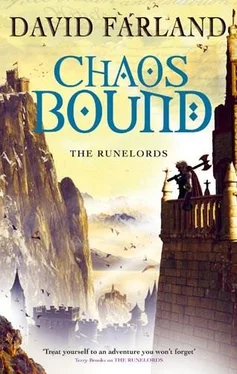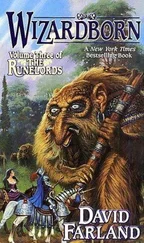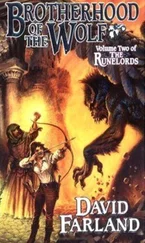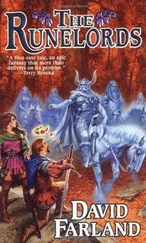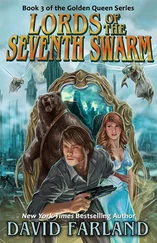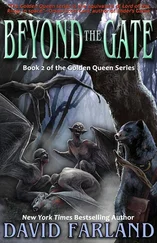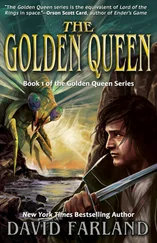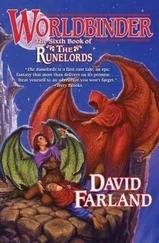She could not make love to such a man.
“You know me,” Borenson said. “I may look like a monster on the outside, but I am the same man who has slept at your side these past twenty years. My love for you—”
“You have another woman, one who must be sick with grief. Your children must be wondering where you are. . . .”
Borenson hung his head, reached out and stroked her cheek with one finger.
He would have to sail back to Rofehavan, she knew. But that was easier said than done. They had no boat. Perhaps they could buy passage on a ship, but they had nothing to buy passage with. Their only shelter for the night was a bed of ferns at the base of a cliff.
A great feast they’d made in the mid afternoon, but by morning all of the sea life would be going to rot.
Myrrima had to wonder how they’d survive the coming week, much less make it back to Rofehavan.
She didn’t even want to think about going back.
Myrrima had always felt so strong, but something was wrong. Her muscles ached as if from fatigue, a weariness that made her fear sleeping, lest she never wake again. To stand or move took immense effort. The numbing weariness wasn’t just upon her, but upon her children and the Walkins, too—seemingly everyone but Borenson.
“It could be months or years before I make it back to Rofehavan,” Borenson confirmed. “All of Garion’s Port is drowned. A ship might come in time, but even if it does, I may not be able to buy passage. . . .” He took a deep breath, as if to broach a topic that he dared not discuss, and then released it again, his head shaking from side to side.
All of his old mannerisms are there, Myrrima realized. It is as if my husband is wearing different flesh.
“Say what is on your mind,” Myrrima begged.
“I want you and the children to come back to Rofehavan with me,” Borenson said. “I dare not leave you here without food or a home—” Myrrima began to object, for even if she wanted to go back to Rofehavan, finding a ship might be impossible.
“Hear me out!” Borenson begged. Myrrima fell silent as he struggled for words.
“I have been thinking,” he said, “for long hours. Not everything is clear to me yet, but much is clear.
“I believe that Fallion bound two worlds together as an experiment, to see what would happen in such an event, and I believe that his experiment failed.
“We could be in grave danger, more danger than you—or Fallion—yet know.
“You wonder why I have joined with my shadow self and you have not? I have an answer: On our former world there were millions and millions of people, strewn all across Rofehavan and Indhopal, Inkarra and Landesfallen. But on the shadow world where I came from, humankind was all but wiped out. There were only forty thousand of us, living in one vast enclave upon a mountain deep within the borders of what you call Mystarria. Our enemies had all but destroyed us.
“I think that you did not join with your shadow self,” Borenson said softly, “because you had no shadow upon that world to join with.”
Dead, Myrrima realized. On that world my shadow self was dead.
It made sense. She felt more dead than alive right now. The strange exhaustion that had come upon her . . .
“On the shadow world,” Borenson continued, “there are creatures called wyrmlings. They are giants, larger than I am. They’re fierce, and they eat human flesh. They’ve hunted mankind nearly to extinction.”
“Are there other creatures from that world that we do not have on ours?” Myrrima asked.
“A few,” Borenson said. “The birds and squirrels are different, as you will see.”
“Are there other monsters besides wyrmlings—things that we should be warned about?”
The giant shook his head no. “The wyrmlings,” Borenson continued, “number in the millions. They hide in great tunnels and warrens beneath the ground by day, and only come out to hunt by night. A large wyrmling stands up to nine feet tall and can weigh seven hundred pounds.”
“So they are like the arr, or like sea apes?” Myrrima asked. The arr was a race of giants that had once lived in the mountains throughout Rofehavan. They were like apes in form, but much larger.
“They look more like men,” Borenson said. “Legend says that they once were men, but they began to breed themselves for size and strength, just as my people do. In time they changed.”
Myrrima shook her head. “How can that be?”
“Are not the beagle and the mastiff both brothers to the wolf?” Borenson asked. “Do not the pony and the war horse both come from the same stock? It is the same with people. Some say that humans and wyrmlings share common ancestors, but I do not believe it. When you see one, you will know. They have no love or compassion. All that is in them is fierceness and hunger.
“They live for one reason, hoping for only one reward,” Borenson said, and he paused for a moment, as if unsure is he should speak more, “they hope that their evil deeds will be great enough so that a locus may feed upon their souls.”
Myrrima gasped. A locus was a parasite, a being that fed upon men’s spirits. Once it attached to a human host, it controlled him. It rode him the way that a man rides a horse, turning him this way and that. A man who had lost his soul to a locus became a crazed thing, ruthless and vile.
“They want this?” Myrrima asked. It was a horror beyond imagination.
Borenson frowned, as if searching for the right words. “They have been trained to want it, for generation after generation. They are taught to believe that the soul of a man dies shortly after the death of the body, and that his spirit is like a mist that fades and dissipates. They have been taught to believe that only a locus is immortal, and if it feeds upon them, consumes their spirit, it will live on.”
Borenson paused. A star shot overhead, and in the distance out among the rocks a herd of rangits suddenly began to bound away, startled by some noise, thumping as their huge bodies landed upon the compact ground. Cicadas were buzzing up among the trees. Myrrima wondered where Draken was, when he would return. The night was half gone, and dawn was mere hours away. She hunched up a little, hugging herself for warmth. It was a summer night, but dampness made it feel cool.
She sniffed. The Walkins’ fire just up the trail had gone out, leaving only the scent of ash. The night flowers of a nearby bush had opened so that the shadows under a ledge were filled with a wonder: white petals like wild peas that glowed with their own inner light; the shadows were filled with numinous stars.
A great uneasiness began to assail Myrrima. If what Borenson said was true, then a new horror had arisen in Rofehavan, something so monstrous that it boggled the mind.
She could not quite fathom it. She could not imagine people engaging in a breeding program that spanned generations. The mind revolted at the thought. One could not help whom one fell in love with. Her son was proof of that. Draken was hardly more than a boy, but he had found this girl Rain, and he wanted to marry her. He seemed totally devoted to her.
She tried to adjust her thinking, and the dangers presented by the wyrmlings seemed clear.
Yet Borenson spoke of returning to Rofehavan, and of taking her family back there.
“You want to go and fight!” she said.
The giant set his jaw, the way her husband used to do when he was determined upon some course. “I have to go back and fight—and you must come with me!”
Myrrima wanted to argue against his plan. She’d fought in wars before. She’d fought Raj Ahten’s armies, and had slain reavers in battle. She was the one who had slain a Darkling Glory at Castle Sylvarresta.
Читать дальше
